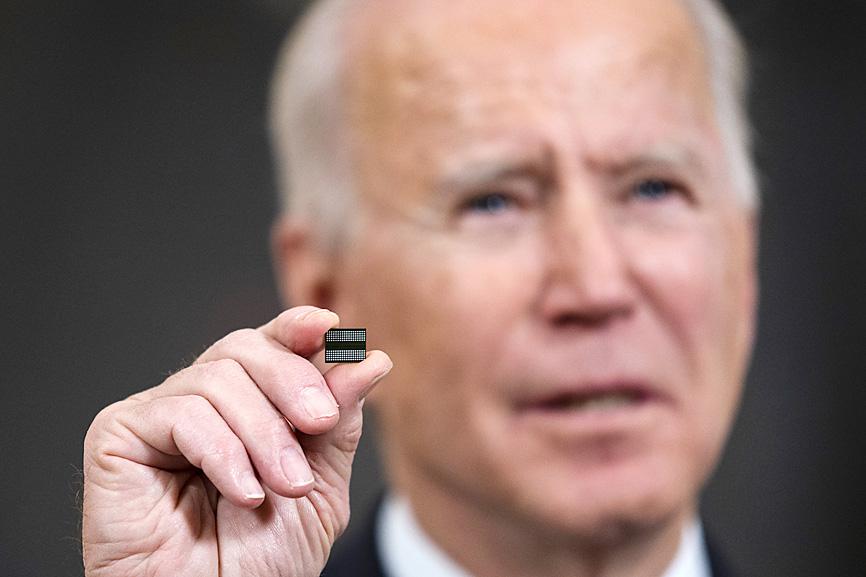A Chinese semiconductor industry group yesterday agreed to work with its US counterpart on chip-related issues, a rare example of bilateral cooperation in an area that has become a focal point of tensions between Washington and Beijing.
The China Semiconductor Industry Association (CSIA) said in a statement on its Web site that it would form a working group with the Washington-based Semiconductor Industry Association.
Ten chip companies from each nation would meet twice a year to discuss policies ranging from export curbs to supply-chain safety and encryption technology, the statement said.

Photo: EPA-EFE
Shares of Chinese firms involved in the chip industry advanced after the statement.
Shares of Semiconductor Manufacturing International Corp (SMIC, 中芯國際) rose as much as 12 percent in Hong Kong trading, while Hua Hong Semiconductor Ltd (華虹半導體) and Shanghai Fudan Microelectronics Group Co (上海復旦微電子集團) surged at least 13 percent and 14 percent respectively.
CSIA did not immediately respond to a request for comment. The US group, which represents firms such as Intel Corp and Qualcomm Inc, has not issued a statement about any cooperation and did not respond to a request for comment sent after business hours.
The future of the semiconductor industry is becoming a major issue in the tense US-China relationship. Chinese Premier Li Keqiang (李克強) vowed in a major speech last week that his country would boost spending and drive research into cutting-edge chips and artificial intelligence, as Beijing seeks to cut reliance on US technologies. China imports US$300 billion of semiconductors annually.
Former US president Donald Trump’s administration took steps to limit the growth of Chinese national champions such as Huawei Technologies Co (華為) and SMIC, China’s largest chip producer. US President Joe Biden’s administration has put technologies such as semiconductors, artificial intelligence and next-generation networks at the core of its policies toward China, and said it will stand up to China and other “techno-autocracies.”
Cooperation between industry groups is badly needed, said Stewart Randall, head of electronics at consultancy Intralink in Shanghai.
“It would be a disaster if two semiconductor worlds were created where nothing was interoperable or there were no standards,” he said.
CSIA was formed by China’s top chip suppliers, labs and investors, including some that are on Washington’s blacklist, according to its Web site.
Its management team includes some of the most prominent figures in the country’s semiconductor industry. The association’s head is SMIC chairman Zhou Zixue (周子學). Xu Zhijun (許志軍), deputy chairman of Huawei’s board, and Zhao Weiguo (趙偉國), chairman of Tsinghua Unigroup Co (清華紫光), are also board members.

The Eurovision Song Contest has seen a surge in punter interest at the bookmakers, becoming a major betting event, experts said ahead of last night’s giant glamfest in Basel. “Eurovision has quietly become one of the biggest betting events of the year,” said Tomi Huttunen, senior manager of the Online Computer Finland (OCS) betting and casino platform. Betting sites have long been used to gauge which way voters might be leaning ahead of the world’s biggest televised live music event. However, bookmakers highlight a huge increase in engagement in recent years — and this year in particular. “We’ve already passed 2023’s total activity and

Nvidia Corp CEO Jensen Huang (黃仁勳) today announced that his company has selected "Beitou Shilin" in Taipei for its new Taiwan office, called Nvidia Constellation, putting an end to months of speculation. Industry sources have said that the tech giant has been eyeing the Beitou Shilin Science Park as the site of its new overseas headquarters, and speculated that the new headquarters would be built on two plots of land designated as "T17" and "T18," which span 3.89 hectares in the park. "I think it's time for us to reveal one of the largest products we've ever built," Huang said near the

China yesterday announced anti-dumping duties as high as 74.9 percent on imports of polyoxymethylene (POM) copolymers, a type of engineering plastic, from Taiwan, the US, the EU and Japan. The Chinese Ministry of Commerce’s findings conclude a probe launched in May last year, shortly after the US sharply increased tariffs on Chinese electric vehicles, computer chips and other imports. POM copolymers can partially replace metals such as copper and zinc, and have various applications, including in auto parts, electronics and medical equipment, the Chinese ministry has said. In January, it said initial investigations had determined that dumping was taking place, and implemented preliminary

Intel Corp yesterday reinforced its determination to strengthen its partnerships with Taiwan’s ecosystem partners including original-electronic-manufacturing (OEM) companies such as Hon Hai Precision Industry Co (鴻海精密) and chipmaker United Microelectronics Corp (UMC, 聯電). “Tonight marks a new beginning. We renew our new partnership with Taiwan ecosystem,” Intel new chief executive officer Tan Lip-bu (陳立武) said at a dinner with representatives from the company’s local partners, celebrating the 40th anniversary of the US chip giant’s presence in Taiwan. Tan took the reins at Intel six weeks ago aiming to reform the chipmaker and revive its past glory. This is the first time Tan